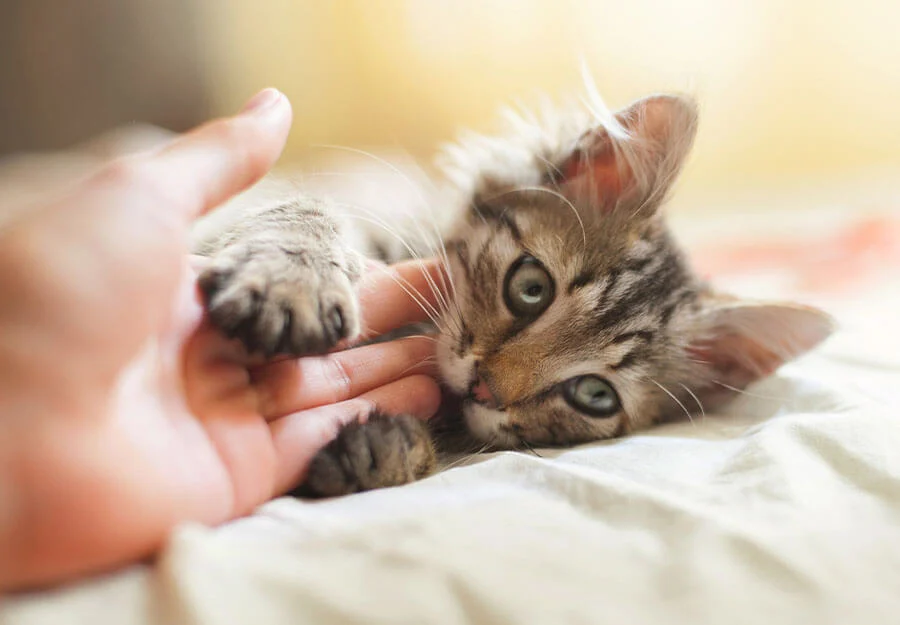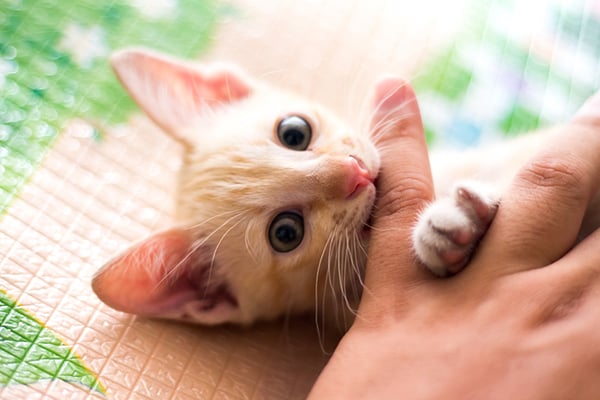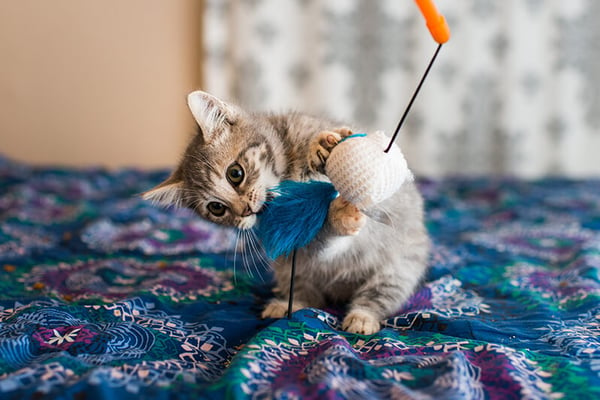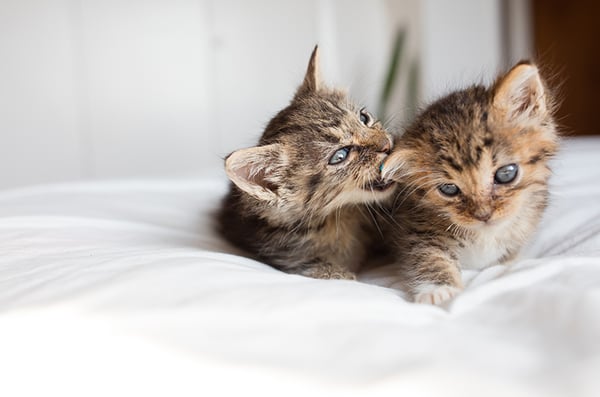
Kittens are curious and playful, but they have to learn the difference between playing with you and playing with their littermates. Check out these 9 tips for how to stop a kitten from biting, and teach your kitty a better way to play.
The love bites may seem cute at first, but what happens when your toddler becomes the object of biting. The play bites get harder as your kitten gets bigger and stronger, so it’s best to nip the issue in the bud before your kitten builds this painful habit.
Luckily, it isn’t too hard to train your little furry friend to change this unwanted habit, but it is best to start as early as possible.
If you are preparing for a new kitten, make sure you have the right gear to start her off on the right track. Try our new kitten checklist to make sure that you have everything you need to teach your kitten good behaviours.
Understanding Why Kittens Bite
Scratching and nibbling are some of the ways that your baby cat learns, plays, and tests boundaries.
Kittens also go through a teething stage, just like puppies. While biting is not as common in teething kittens, keep in mind your kitten may be trying to soothe her aching gums. Keep in mind that your kitten does not want to hurt you, so try not to get immediately frustrated by your kitten's naughty behaviour.
Kittens learn a lot of their social and communication skills from their mom and littermates. If you take a kitty from her litter too early, she might bite harder than a kitten who’s spent more time learning boundaries with her brothers and sisters.
The longer they stay together, the sooner they will learn how strong they can bite others and how to play more gently.
In most cases, your furry friend will outgrow play biting by 12 months of age, some as soon as their adult teeth are fully grown, but you may worry about how to 'survive' by this nippy period.
9 Tips for How to Stop a Kitten from Biting
Once your kitten starts biting you, you should take steps to teach her that this is not acceptable behaviour. There are several ways to do this. Every cat is different and may respond to some of these techniques better than others. Here are 9 techniques you follow in the kitten biting phase:
1. React calmly

Even though some experts recommend the 'yelling ouch' method, my experience is different. My Clementine was just a tiny kitten when she picked me up on the street. She did not have an opportunity to learn how to behave appropriately in her litter, and she was prone to biting.
However, the only thing I needed to do was to cuddle her. At the same time, I gently said that it hurt me. She understood that I did not like it the next day after my second reaction.
It’s best to avoid shouting, hitting, or losing your temper with your cat. She will not understand, and you may end up with a frightened, nervous, and insecure kitten instead.
2. Have patience
Patience is crucial when you want to teach your kitten something. Try to be consistent each time and react the same way to your kitty’s repeated bad behaviour. If you change up your reaction to her biting habit, she will struggle to associate your responses with her actions.
If attention is what she seeks, then you may see other behaviours to try to encourage physical playtime, like scratching and pouncing, standing up on her hind legs to paw at you, or becoming very vocal.
It's up to you to decide which behaviours are acceptable behaviour, but using the same tricks and patience can be effective for correcting the most annoying kitten behaviours.
3. Encourage your cat
Since cats respond better to positive reactions, you should find a way to praise and reward her when she behaves appropriately with some treats or a fun toy.
In time, she will understand that playing nicely gets her a reward and playing too rough or being aggressive does not.
4. Provide the kitty with toys and kitten teething toys

Your kitten adores playing, and one of the most successful methods to teach polite play habits is to redirect your cat’s attention from your fingers to kitten-teething toys.
Wand toys are an excellent choice for this purpose, especially those made of rubber, soft plastic, or fabric. They keep your hands far from her bite zone and still allow her to hunt, tackle, and even bite.
Any interactive cat toy or interactive toy will do, though. As soon as your kitten starts nibbling the kitten chew toys, reward her with something yummy. This will train her to associate toys with a pleasant reward.
Do kittens' teeth need toys? Soft toys can also help to soothe sore gums as her baby teeth come out and the adult ones start shifting around during the teething process.
Try to have a variety of kitten teething toys and other toys of different sizes, shapes, and fabrics, and allow your kitten to choose the toys that soothe her most.
5. Hand-clapping method
When your dominant, aggressive kitty bites you, you can clap your hands and say 'NO' Don't yell, though. Say it in a stern but normal voice. Repeat this whenever your cute but cheeky feline bites you.
This helps to break her attention from her attack mode and gives you a chance to redirect her attention or just walk away.
Never use this method if your cat is nervous or timid. Frightening her can lead to further attacks or cause other anxious behaviours and distrust.
6. Start hissing like a cat-mom
One of the most effective ways to interrupt biting is to mimic a momma cat. As soon as your kitty bites you, make a sharp hissing sound- SSSST - like a mother cat makes when she wants to warn her kids to stop misbehaving.
Since feline hissing means 'back off,' this method is very effective, especially if your furry baby is under four months of age.
7. The 'ouch!' method
As soon as your cat bites you, you should loudly, sharply, and clearly say 'ouch' right away. Once you have her attention, calmly pull your hand away.
Avoid touching your kitty. Otherwise, it may believe that you want to play and will probably bite you again. Use this particular method for a kitten that is at least 6 to 7 months of age.
8. Stop playing with the cat
Once your kitty bites you, your first reaction should be to remove your hands and stop touching them. If it doesn't understand or continues to try to engage you, remove the cat from your lap, stand up, or just walk away.
Repeat this method every time your baby cat tries to bite. Removing attention, reward, or a desirable reaction will help her associate her unacceptable behaviour with your ignoring her.
Never try to soothe your furry friend after biting because it probably will not understand your signal. However, if you walk away in the middle of the play, your kitten will know that something is wrong.
Also, avoid cuddling and petting your kitten for a while. If you start with this right away, it will confuse your kitty, and she may learn to bite you just to get attention.
9. Get Your Kitten a Sibling

I know that it is not practical for all families, but if you can have two cats, it will be an excellent way to solve the problem of biting. After introducing a playmate, your cat will not need to bite you. Instead, it will play that with someone who understands and does not mind the rough play.
Adopting an adult cat to pair with your kitten is a good idea. The older cat will quickly teach the younger kitty what is and isn’t acceptable behaviour.
Conclusion
If you have been unknowingly encouraging biting behaviours, then it is important to implement one or more of the tips consistently. The longer the biting behaviour continues, the harder it is to retrain her.
If your kitty notices that her biting behaviours are no longer getting her the reactions she wants, she will adapt her play style. Just make sure you are offering her appropriate and exciting alternatives for playtime.
Frequently Asked Questions
Why do kittens bite?
Kittens bite as part of their natural play and exploration. It's how they learn about their environment and develop hunting instincts.
How can I discourage my kitten from biting me?
Provide lots of toys for them to bite and chew on. If your kitten bites during play, redirect their attention to a toy and avoid using your hands as playthings.
Is kitten biting behaviour normal?
Yes, biting is normal kitten behaviour. However, it's crucial to differentiate between gentle play bites and aggressive behaviour.
How can I teach my kitten to stop biting?
Use positive reinforcement by rewarding gentle play and ignoring or redirecting aggressive biting. Consistency and patience are key to teaching your kitten not to bite.
What if my kitten's biting becomes aggressive?
If your kitten's biting becomes aggressive, consult a veterinarian. There could be an underlying health problem.
Will my kitten outgrow biting?
With proper training, patience, and socialization, most kittens will outgrow biting.
.png?width=200&height=66&name=logo%20(1).png)



